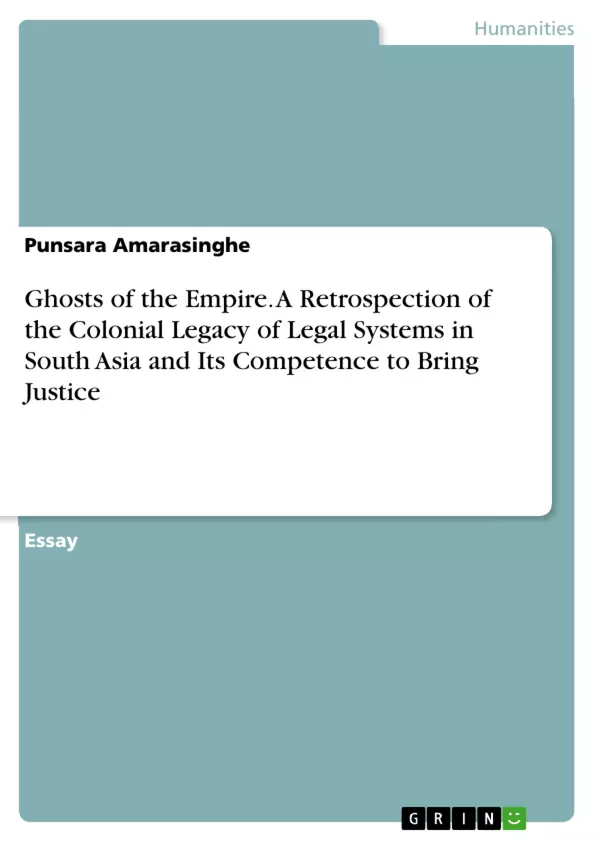This paper examines the development of the modern legal system in South Asia as a colonial legacy which essentially meant to be a tool for the aspirations of colonial administrators. Furthermore the depiction of colonial view on oriental practices and its sheer unsuccessful manner is highlighted in this paper.
In the words of Frantz Fanon in "The Wretched of the Earth", white men had a desire to possess the world and assumed himself predestined to rule the world. Indeed the legal nexus that has been expanded around every nook and corner of the Indian Subcontinent and Sri Lanka can be attributed to those white Sahibs who ruled this part for many decades. In the poetic sense of Rudyard Kipling it was known as "White man’s burden" which outrageously justified European moral obligation to subjugate Oriental nations to make them civilized. However the chains of events that occurred as a part of colonials caused to degenerate the subjects morally and their resources were abhorablly plundered. In order to legitimize the colonial exploitation and making the subjects meek and obedient to the colonial administration, they used law as a competent tool.
Inhaltsverzeichnis (Table of Contents)
- Ghosts of the Empire: Retrospection of the colonial legacy of legal systems in South Asia and its competence to bring justice
- Introduction
- The colonial legacy of legal systems in South Asia
- The impact of British rule on the legal system
- The anomaly of legal system planted by British in South Asia
- The impact of Victorian morality on the legal system
- The impact of colonial laws on the access to justice
- The British interest in passing legislations to control amorous acts or activities relating to sexuality in India
- The hypocrisy of British laws regarding prostitution
- The British attempt to understand the nature of local laws
- The impact of British codification on the local legal systems
- The British legacy of legal systems in South Asia
- The impact of British legal systems on the access to justice
- The impact of British legal systems on the language of proceedings
- The impact of colonial laws on the legal system
- The impact of the sedition law on the legal system
- The impact of the section 377 of Indian penal code on the legal system
- Conclusion
Zielsetzung und Themenschwerpunkte (Objectives and Key Themes)
This paper aims to examine the colonial legacy of legal systems in South Asia, focusing on the impact of British rule on the legal system and its competence to bring justice. It delves into the nature of the legal system planted by the British and explores how their legal vision affected the moral life standards of the people.
- The impact of British colonialism on the legal systems of South Asia
- The influence of Victorian morality on the legal system
- The challenges of accessing justice in the aftermath of colonialism
- The persistence of colonial laws and their implications for modern societies
- The role of language and cultural differences in the administration of justice
Zusammenfassung der Kapitel (Chapter Summaries)
- Introduction: This chapter introduces the topic of the colonial legacy of legal systems in South Asia, focusing on the impact of British rule on the legal system and its competence to bring justice.
- The anomaly of legal system planted by British in South Asia: This chapter explores the impact of Victorian morality on the legal system and the ways in which colonial laws hindered the access to justice for ordinary people.
- The British interest in passing legislations to control amorous acts or activities relating to sexuality in India: This chapter examines the hypocrisy of British laws regarding prostitution and how they reflected a racial bias against local Indian women.
- The British attempt to understand the nature of local laws: This chapter discusses the British attempts to understand and codify local legal systems, highlighting the challenges they faced in interpreting and translating complex legal texts.
- The British legacy of legal systems in South Asia: This chapter explores the long-term consequences of British rule on the legal systems of South Asia, focusing on the enduring impact on access to justice and the language of legal proceedings.
- The impact of colonial laws on the legal system: This chapter examines the impact of specific colonial laws on the legal systems of South Asia, highlighting the continued use of laws such as the sedition law and section 377 of the Indian penal code.
Schlüsselwörter (Keywords)
The main keywords and focus topics of the text include colonial legacy, legal systems, South Asia, British rule, Victorian morality, access to justice, sedition law, section 377, language of proceedings, and cultural differences.
Frequently Asked Questions
How did British rule impact the legal systems of South Asia?
The British used law as a tool to legitimize colonial exploitation and to make subjects obedient to the colonial administration.
What is "Victorian morality" in the context of colonial law?
It refers to the moral standards imposed by the British that led to legislations controlling sexuality and amorous acts in India, often with racial bias.
What is Section 377 of the Indian Penal Code?
It is a colonial-era law that criminalized certain sexual acts, reflecting British legal and moral visions of that time.
Why did the British codify local laws?
The British attempted to understand and codify local laws to better control the population, though they often struggled with interpretation and translation.
Does the colonial legal legacy still affect justice today?
Yes, the paper argues that the persistence of colonial laws and the language of proceedings continue to hinder access to justice in modern South Asian societies.
- Citar trabajo
- Punsara Amarasinghe (Autor), 2017, Ghosts of the Empire. A Retrospection of the Colonial Legacy of Legal Systems in South Asia and Its Competence to Bring Justice, Múnich, GRIN Verlag, https://www.grin.com/document/377225



